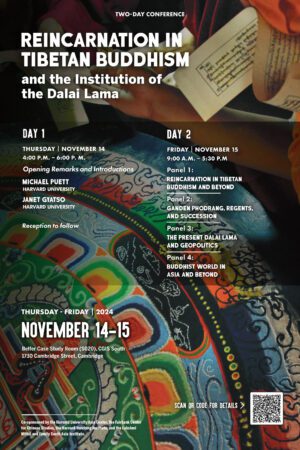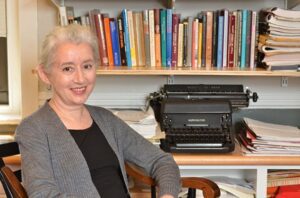 For the first time at Harvard, scholars will gather on November 14-15 for a conference on “Reincarnation in Tibetan Buddhism and the Institution of the Dalai Lama.” Reincarnation recognition, which began in the 13th century as a distinctive practice in Tibetan Buddhism, is the belief that after death, the soul or consciousness is reborn in a new body. The conference, co-sponsored by the Mittal Institute, the Harvard University Asia Center, the Fairbank Center for Chinese Studies, and the Harvard-Yenching Institute, will look at the history across the region, the esoteric practices of rebirth and divination, and the modern-day geopolitical implications of the continuation of this practice across Tibetan, Himalayan, Mongolian, and Central Asian communities—and across the Buddhist world in Asia and beyond.
For the first time at Harvard, scholars will gather on November 14-15 for a conference on “Reincarnation in Tibetan Buddhism and the Institution of the Dalai Lama.” Reincarnation recognition, which began in the 13th century as a distinctive practice in Tibetan Buddhism, is the belief that after death, the soul or consciousness is reborn in a new body. The conference, co-sponsored by the Mittal Institute, the Harvard University Asia Center, the Fairbank Center for Chinese Studies, and the Harvard-Yenching Institute, will look at the history across the region, the esoteric practices of rebirth and divination, and the modern-day geopolitical implications of the continuation of this practice across Tibetan, Himalayan, Mongolian, and Central Asian communities—and across the Buddhist world in Asia and beyond.
We spoke to Prof. Janet Gyatso, Hershey Professor of Buddhist Studies at Harvard Divinity School and one of the conference conveners, about the concept of reincarnation and what we can expect at the conference.

Prof. Janet Gyatso, Harvard Divinity School
Mittal Institute: Professor Gyatso, can you talk to us about the ideation of the conference? How did the concept develop?
Janet Gyatso: The role of reincarnation of high lamas in Tibet has profound impact on Tibetan religious history as well as political formations since the 13th century at least. The practice of recognizing the reincarnation of a master and putting that person back in charge of the monastery or institution where they served in a previous life continues today, across the Tibetan plateau and both inside the PRC and the Tibetan community in exile. Given the simultaneous religious and geopolitical implications of the practice across Asia as well as in many other parts of the world, it is a most appropriate topic of study and reflection for the Asia Center.
Given the simultaneous religious and geopolitical implications of the practice across Asia as well as in many other parts of the world, it is a most appropriate topic of study and reflection for the Asia Center.
Mittal Institute: Can you share more about your scholarly experience with reincarnation? When did you begin to study this field?
Janet Gyatso: I have studied Tibetan Buddhism since my undergraduate days at University of California at Berkeley. I went on to get a Ph.D in Buddhist Studies with specialization in Tibet. I have since taught Tibetan religion and culture at several institutions and to publish on various topics in the field, including autobiographical literature, and the intersection of traditional medicine and Buddhism in Tibet.
Mittal Institute: Can you give our readers a brief introduction into the main concepts behind reincarnation, and how they interface with the Dalai Lama?
Janet Gyatso: According to Buddhism, all sentient beings reincarnate, moving from life to life in various forms. Most beings don’t have control over this process; it is dictated by their previous karma. But certain highly developed meditation masters can retain consciousness and intention during the process of death, the intermediate state, and rebirth, and choose an appropriate set of parents in order to continue the work for the benefit of the world that the master had undertaken in their past life. Such people are recognized as reincarnated lamas. The Dalai Lama is one example of this practice. The current Dalai Lama, who lives in North India, is the 14th in a line that goes back to the 15th century. The Dalai Lama is particularly well known because since the 5th incarnation, the Dalai Lamas also headed the Tibetan government, up until the Chinese takeover in 1959.
Mittal Institute: You will have four panels (Reincarnation in Tibetan Buddhism and Beyond, see here; Ganden Phodrang, Regents, and Succession, see here; The Present Dalai Lama and Geopolitics, see here; and Buddhist World in Asia and Beyond, see here), each with a variety of presentations from expert scholars. How did you devise these panel topics?
Janet Gyatso: The papers were grouped so as to start with the general practice of reincarnating lamas, then moving to the process of their selection as well as their involvement in governing Tibet, and then finally the last two panels consider the current position of the Dalai Lama and other reincarnated lamas in present times.
Mittal Institute: What is something you hope the audience takes away from the conference?
Janet Gyatso: Asia Center hopes that the topic of reincarnating lamas will introduce attendees to some of the history and fascinating complexities of Tibetan culture, and will give experts the opportunity to explore the nuances of the phenomenon as it continues to unfold in the 21st century.
☆ The views represented herein are those of the interview subject and do not necessarily reflect the views of the Mittal Institute, its staff, or its steering committee.
